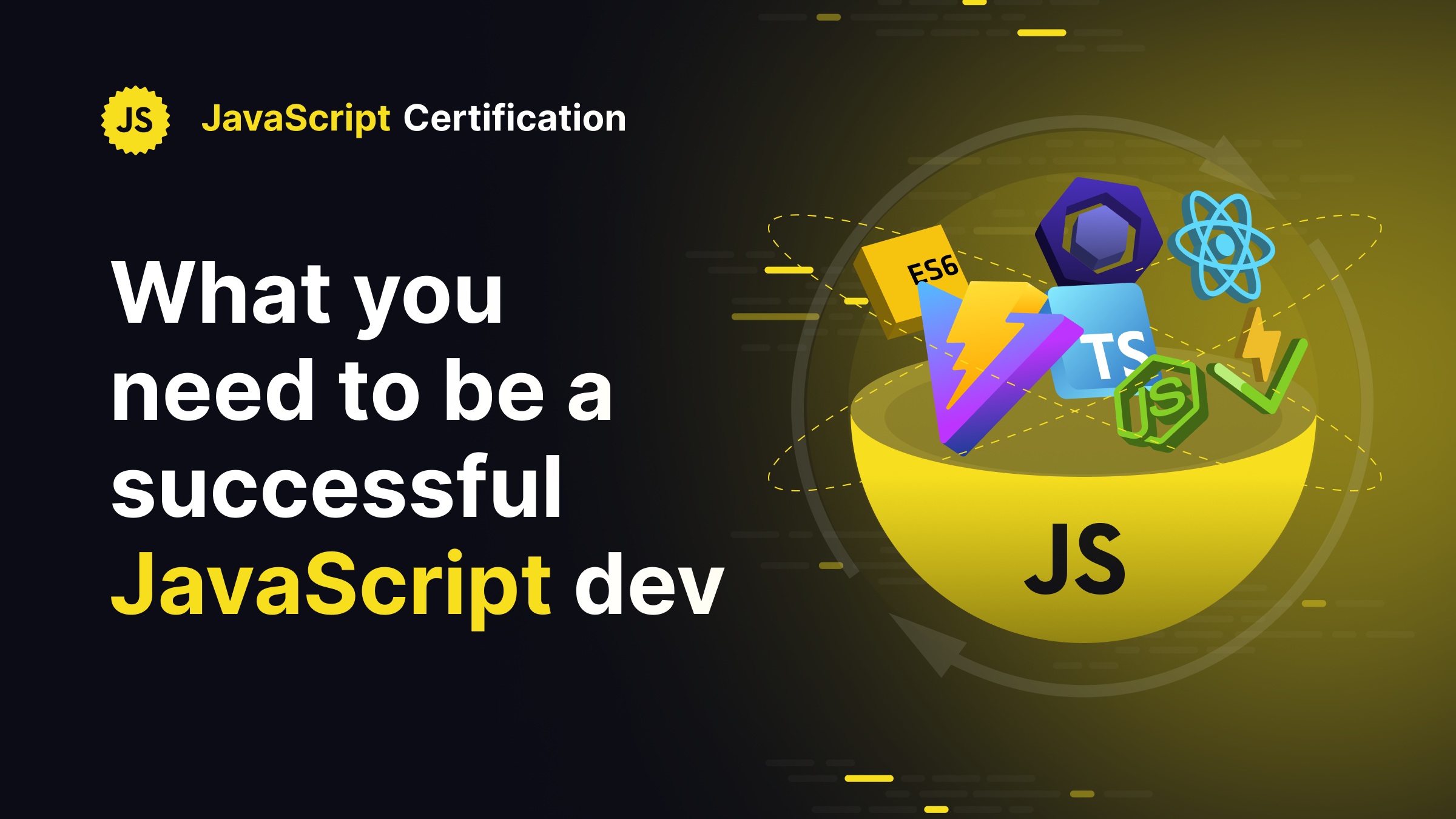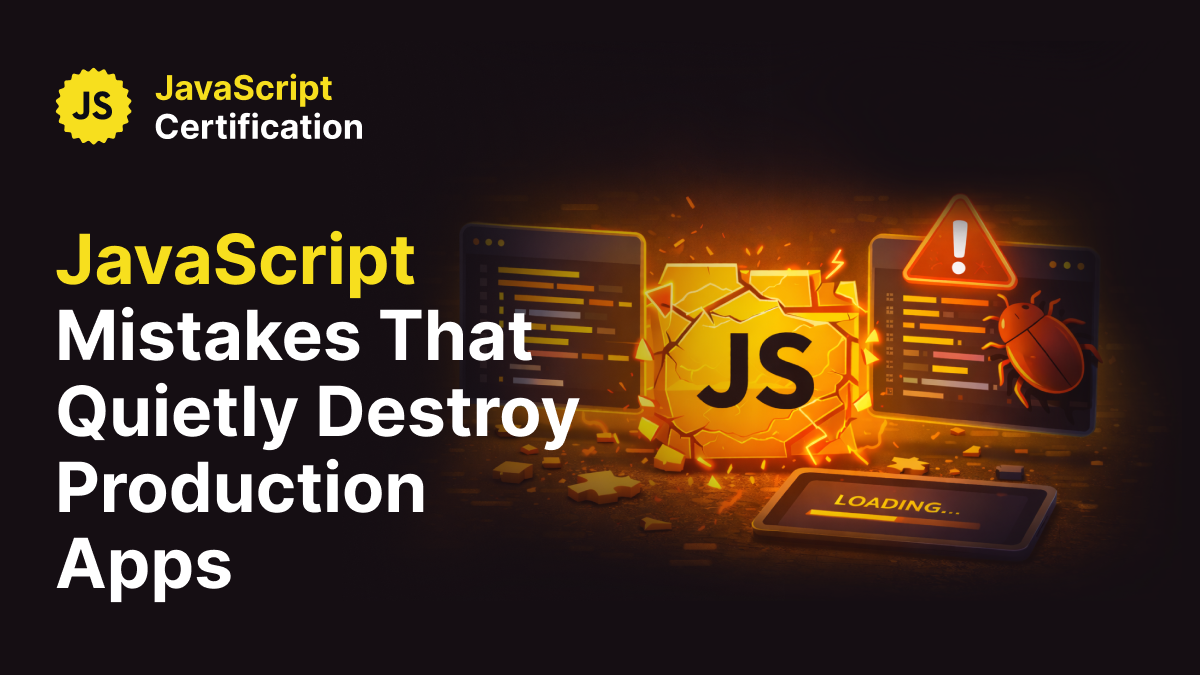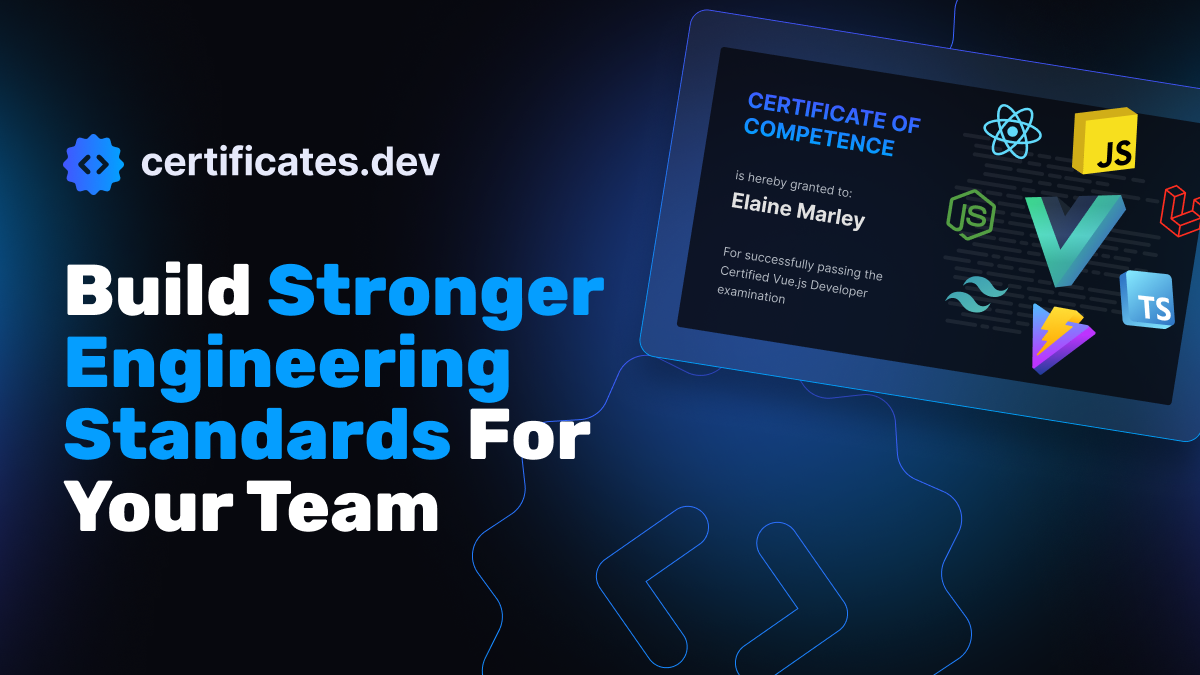
What you need to know to be a successful JS dev
Explore essential JavaScript skills for junior and mid-level developers. From core concepts to advanced features, learn what's needed to build robust web applications. Find out how to validate your expertise and grow your career in web development.
Daniel Kelly
September 5, 2024
JavaScript has come a long way since its inception. Once limited to simple browser interactions, it now powers complex web applications, server-side processes, and even ventures into AI and machine learning. This evolution has expanded the skillset required for JavaScript proficiency, creating both challenges and opportunities for developers at all levels.
For those embarking on their JavaScript journey or looking to solidify their skills, the path forward might seem daunting. What exactly does it take to build a successful JavaScript knowledge base? Which skills are truly essential, and which are nice-to-haves?
In this blog, we'll explore the core competencies that form the backbone of JavaScript proficiency, aligned with the junior and mid-level preparation guides for the JavaScript Certification program from Certificates.dev. Whether you're writing your first function or tackling complex asynchronous operations, these are the skills that will serve as your building blocks for success.
Laying the Groundwork: Junior-Level Essentials
Every JavaScript developer's toolkit begins with these fundamental concepts:
Variables and Data Types:
Understanding how to declare variables and work with strings, numbers, booleans, arrays, and objects is your first step.
Example:
let name = "Alice";
const age = 30;
let isStudent = false;
let hobbies = ["reading", "coding", "hiking"];
Control Structures:
Proficiency with conditionals and loops allows you to control the flow of your programs.
Example:
if (age >= 18) {
console.log("You can vote!");
} else {
console.log("You're too young to vote.");
}
for (let hobby of hobbies) {
console.log(`I enjoy ${hobby}`);
}
Functions:
Knowing how to define and use functions is crucial for organizing and reusing code.
Example:
function greet(name) {
return `Hello, ${name}!`;
}
console.log(greet("Bob")); // Outputs: Hello, Bob!`
These foundational skills form the bedrock of your JavaScript knowledge. They're not just academic concepts – you'll use them daily in real-world development.
Advancing Your Skills: Mid-Level Proficiencies
As you progress in your JavaScript journey, you'll need to build on these basics. The mid-level (Level 2) Certification Guide introduces more advanced concepts:
DOM Manipulation:
Interacting with web page elements is a key skill for front-end development.
Example:
document.getElementById("myButton").addEventListener("click", function() {
document.body.style.backgroundColor = "blue";
});
Asynchronous Programming:
Understanding Promises and async/await is crucial for handling operations like API calls.
Example:
async function fetchUserData() {
try {
const response = await fetch('https://api.example.com/user');
const userData = await response.json();
console.log(userData);
} catch (error) {
console.error('Failed to fetch user data:', error);
}
}
ES6+ Features:
Modern JavaScript introduces powerful features like arrow functions, destructuring, and modules.
Example:
const numbers = [1, 2, 3, 4, 5];
const doubled = numbers.map(num => num * 2);
console.log(doubled); // Outputs: [2, 4, 6, 8, 10]
Practical Application and Problem Solving
Knowing syntax is just the beginning. True JavaScript proficiency comes from applying this knowledge to solve real-world problems. This involves:
- Breaking down complex problems into smaller, manageable parts
- Choosing the right tools and approaches for each task
- Writing clean, maintainable code that others can understand and build upon
For instance, when building a web application, you might use your DOM manipulation skills to create an interactive UI, asynchronous programming to fetch data from a server, and ES6+ features to write more concise and readable code.
Continuous Learning
JavaScript is an ever-evolving language. Staying updated with its latest features and best practices is crucial for long-term success. Some ways to keep learning include:
- Regularly reading documentation and following JavaScript blogs
- Participating in coding challenges and open-source projects
- Attending workshops and conferences (virtual or in-person)
Validating Your Skills
As you progress in your JavaScript journey, it's important to benchmark your skills. The JavaScript Certification program offers a structured way to validate your knowledge and showcase your expertise to potential employers or clients.
The certification exams are designed to test both your theoretical understanding and practical skills:
- Junior (Level 1) Exam: 30 minutes, 35 multiple-choice questions → Check out the preparation guide for the junior exam
- Mid-level (Level 2) Exam: 105 minutes, 30 multiple-choice questions and 75 minutes of hands-on coding challenges → Check out the preparation guide for the mid-level exam
These exams cover the topics we've discussed and more, providing a comprehensive assessment of your JavaScript proficiency.
JavaScript is your strong foundation
Building a robust JavaScript knowledge base isn't about chasing every new framework or memorizing obscure syntaxes. It's about understanding core principles, practicing problem-solving, and consistently applying your skills to real-world challenges.
Whether you're taking your first steps in JavaScript or looking to reinforce your existing skills, focus on these essential areas. They form the foundation upon which all advanced JavaScript knowledge is built.
Remember, every experienced developer started as a beginner. With consistent practice, curiosity, and a willingness to learn, you can develop a strong, adaptable JavaScript skill set that will serve you well throughout your career.
If you're interested in validating your skills and joining a community of certified JavaScript developers, you can sign up at Certificates.dev for updates about our JavaScript Certification program launching on September 24th. This certification could provide a way to validate your skills and potentially enhance your career prospects.
More certificates.dev articles
Get the latest news and updates on developer certifications. Content is updated regularly, so please make sure to bookmark this page or sign up to get the latest content directly in your inbox.

JavaScript Mistakes That Quietly Destroy Production Apps
Some JavaScript mistakes don’t crash your app, they slowly degrade performance, reliability, and user trust. Here are the ones that cost the most in production.
Martin Ferret
Feb 19, 2026

Build Stronger Engineering Standards For Your Team
Standardise engineering standards in an AI-accelerated environment. Certificates.dev for Teams adds a Team Dashboard, reporting, and procurement-friendly purchasing.
Kristen Abrahams
Feb 19, 2026

Supercharging Nuxt Apps with VueUse
Nuxt encourages composables and VueUse gives you really good ones. If you’re building Nuxt apps and not using VueUse yet, you’re probably working harder than you need to.
Reza Baar
Feb 17, 2026
Looking for Certified Developers?
We can help you recruit Certified Developers for your organization or project. The team has helped many customers employ suitable resources from a pool of 100s of qualified Developers.
Let us help you get the resources you need.

(a Cisco company)